aNewDomain.net — At this weekend’s Restore the Fourth protest rally in San Francisco a ton of people gathered at the famous Vaillancourt Fountain on San Francisco’s Embarcadero to protest the NSA PRISM electronic surveillance project Edward Snowden recently brought to light. The NSA PRISM protest kicked off noon on Sunday, August 4, 2013. It was 1984 day. Even Pentagon Papers leaker Daniel Ellsberg showed.
Read one sign: “1984 was a warning, not a playbook.”
“Who watches the Watchmen?” read another. “Don’t Spy on Me” was a take on one of those Revolutionary War flags from 1776.
“Look how far we haven’t come,” protesters said as part of the day’s over-arching theme.
Here’s my photo gallery. Scroll below the fold to read remarks from famed Pentagon Papers leaker Daniel Ellsberg …
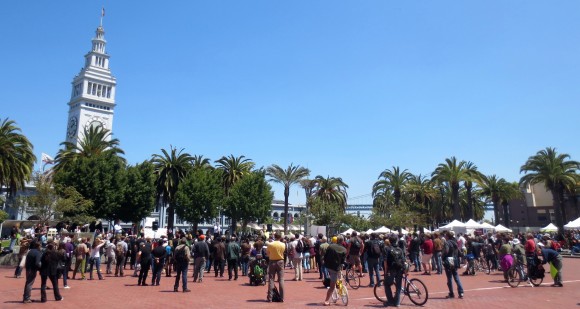
Photo credit: Richard Hay for aNewDomain.net
The Restore the Fourth protest you see above started at Vaillancourt Fountain on the Embarcadero at noon on Sunday. Hundreds of people from all walks of life and political persuasion gathered to read passages from George Orwell’s dystopian sci-fi novel, Nineteen Eighty-Four.
Protesters called for the United States government to act like it is run by the consent of the governed — and they called for Americans and elected officials to tear down the surveillance state erected post 9/11 and executed by the NSA, FBI, CIA, U.S. Postal Service and other government agencies’ secret surveillance programs.
Protesters read passages about all manner of cameras and devices watching you all the time for signs of thought crime and thought police, as described in George Orwell’s 1949 work. Nineteen Eighty-Four was fiction, sure. But the programs that U.S. contractor Edward Snowden brought to light in June is a signal, protesters said, that the U.S. FBI, NSA and other agencies are making Nineteen Eighty-Four seem too close to reality.
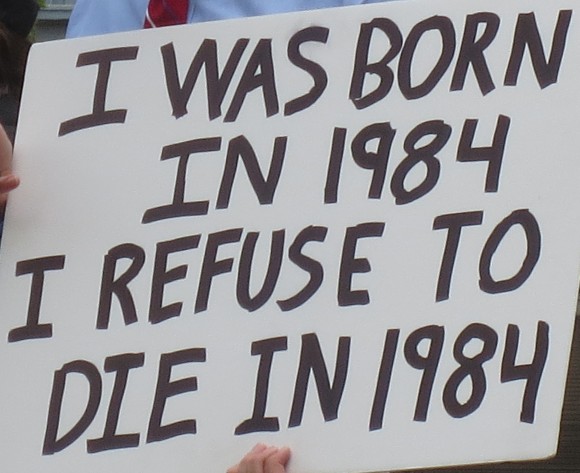
Photo credit: Richard Hay for aNewDomain.net
There are two kinds of surveillance states. One that is abusing its power — and one that will in the future by collecting evidence on people before there even is a crime. Like in the movie Minority Report.
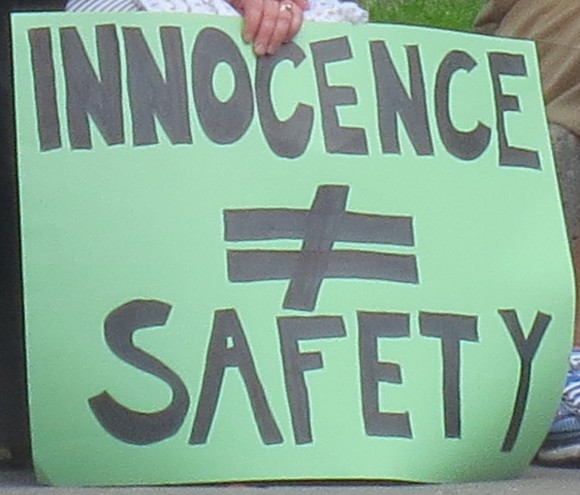
Photo credit: Richard Hay for aNewDomain.net
Blanket fishing-expedition-electronic monitoring of all communications of all citizens is NOT OKAY. That was what the protesters were there to stand up and be counted as saying.
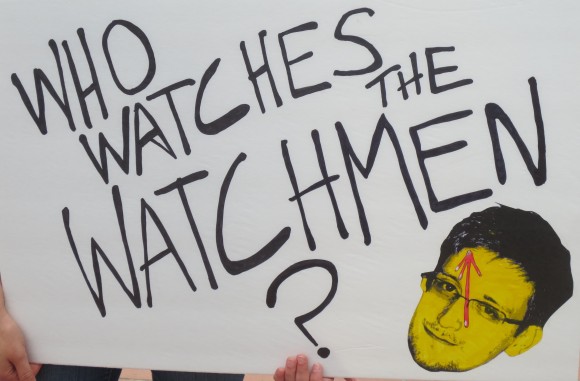
Photo credit: Richard Hay for aNewDomain.net
Protesters called for Barack Obama and Nancy Pelosi to be held accountable for defending the National Security Agency’s e-surveillance programs. These programs are PRISM, for tracking e-communications, Echelon for tracking photo call and communications, and XKeyScore, a program designed to track everything everyone does online. All this according to slides released by government-contractor-turned-political-dissident Ed Snowden. He is the most-wanted man — the U.S. is seeking him for potential charges of treason and theft of government secrets. Snowden, at this writing, is in temporary political asylum in Russia, much to the anger of U.S. officials.
Protesters’ anger targeted elected officials from both parties. The NSA surveillance programs, said protesters, violate Fourth Amendment protections — enacted in 1789 — against unreasonable search and seizure as writ in the U.S. Constitution.
In case you missed that day in history class, the U.S. Fourth Amendment reads:
The right of the people to be secure in their persons, houses, papers, and effects, against unreasonable searches and seizures, shall not be violated, and no warrants shall issue, but upon probable cause, supported by oath or affirmation, and particularly describing the place to be searched, and the persons or things to be seized.”
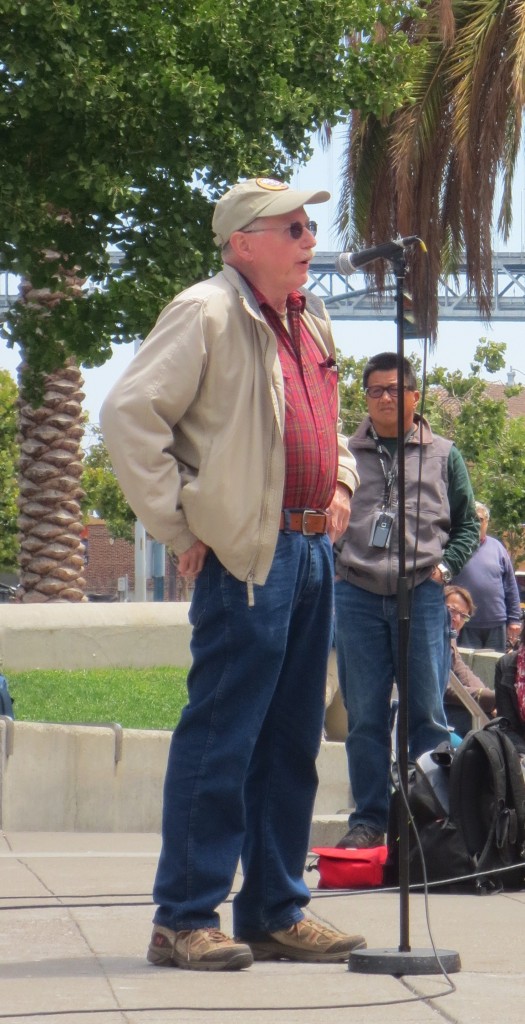
Credit for photo of Mark Klein: Richard Hay for aNewDomain.net
After the readings, there were speakers and some were legendary whistle blowers. There was Mark Klein, who recently released a book on Amazon, Wiring up the Big Brother Machine…and Fighting It.
Mark talked about the optical splitters that use a prism to send 50 percent of Internet signals on fiber to the intended destination and 50 percent to a collection node for federal observation.
That kind of bulk data capture was indiscriminate and it fell far short of the “particularly describing the place to be searched” standard, Klein said.
Klein also spoke of how no one called him to testify before U.S. Congress even when he showed up with Electronic Frontier Foundation attorneys and evidence. Congress, he alleged, is turning a blind eye. Klein claimed Congress did not want to hear his testimony on the record because that would eliminate the ability to have plausible deniability.
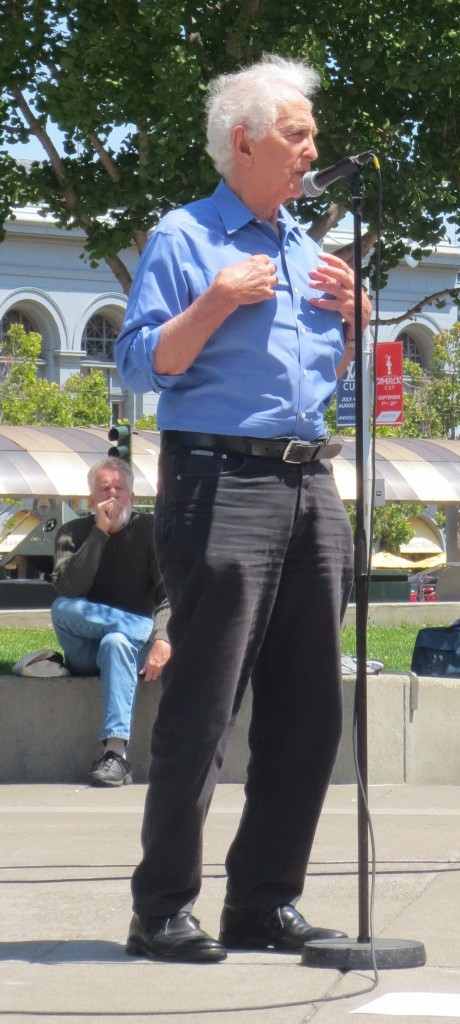
Credit for photo of Daniel Ellsberg: Richard Hay for aNewDomain.net
Daniel Ellsberg was there, too. This is a living legend. He is the former RAND corporation military analyst who released the Pentagon Papers to the press to expose U.S. decision making about the Vietnam War. A whistle blower. Perhaps the most-famous whistle blower of all.
He spoke of how he relates to Bradley Manning and Edward Snowden. He talked about how, at the Manning trial, Manning’s attorney pleaded for mercy because Manning was young and naive. Why does the public have more sympathy for Snowden than Manning?
Daniel Ellsberg said it was because Manning was revealing things the government was doing to other people in far off countries. Conversely, Snowden was revealing things they are doing to us.
It is a simple case of ‘I and the other.’ When the government is affecting me, hold on a second.
Ellsberg spoke of the continuing threat of nuclear winter and the weapons Russia and the U.S. still have and can invoke.
He talked about three flawed lines of thinking that pervade think tanks and analysts’ thinking. TINA — as in, there is no alternative. This is the least-worst of the possible outcomes. Then there’s “We are the good guys.” And the third flawed line of thinking is, “Business as usual,” where this line of thinking is folly and could lead to the ruin of us all. “We are on a bad road,” Ellsberg said.
I was reminded of the Pogo cartoon that opined, “We have met the enemy and he is us.”
Also I was reminded of the oft-quoted statement of Cardinall-Duc de Richelieu et de Fronsac of France.
If one would give me six lines written by the hand of the most honest man, I would find something in them to have him hanged.”
Another speaker was Cullen Hoback, the director of a recent documentary film Terms and Conditions May Apply.
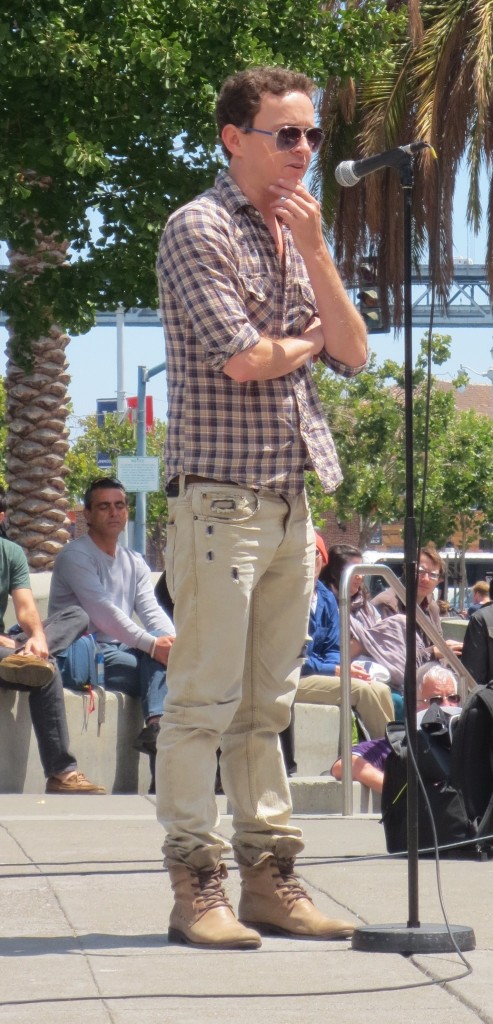
Credit for photo of Cullen Hoback: Richard Hay for aNewDomain.net
His film is playing at the Roxie Theater in San Francisco until August 7. I went and saw it today because he was taking potshots at my employer, Google. I wanted to know exactly what it was about. I ended up disagreeing with one of the premises of the film — that it is dangerous to allow companies to offer free services in exchange for personal information as a business model because it gives the Feds an end run around the protections of the Fourth Amendment.
IMO I think the laws that allow the government to use the rule of law to demand the information — often without a warrant — are what violates the 4th amendment. I should underline that this is my personal opinion. I don’t in any way speak for Google, by the way, though I am a paid employee.
Daniel Ellsberg did say he has hope because there continue to be whistle blowers who stand on principle against things they believe are wrong. This should become a campaign issue and officials should stand up and be counted as those who will propose legislation and vote for change to remove the infrastructure of a surveillance state. That “We the People” can still make changes by demanding accountability from our elected officials.
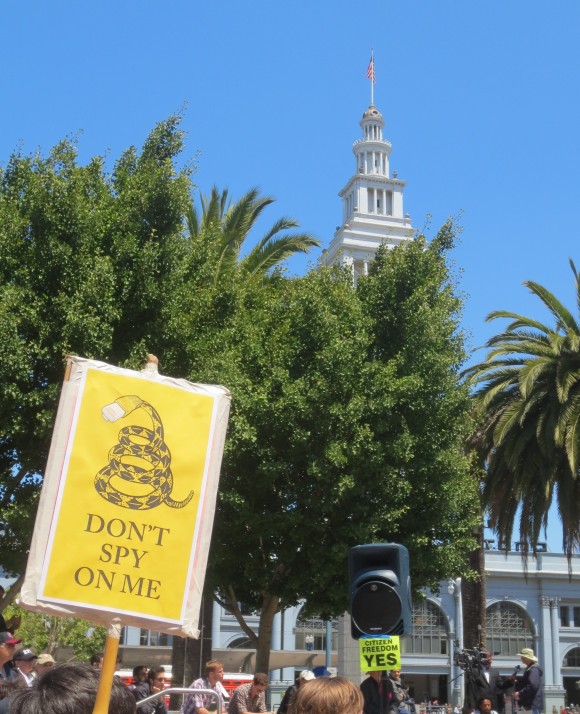
Photo credit: Richard Hay for aNewDomain.net
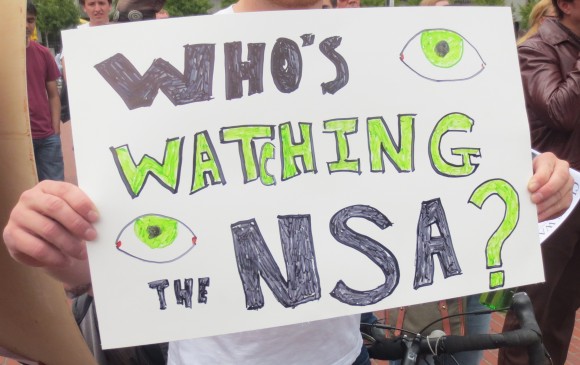
Photo credit: Richard Hay for aNewDomain.net
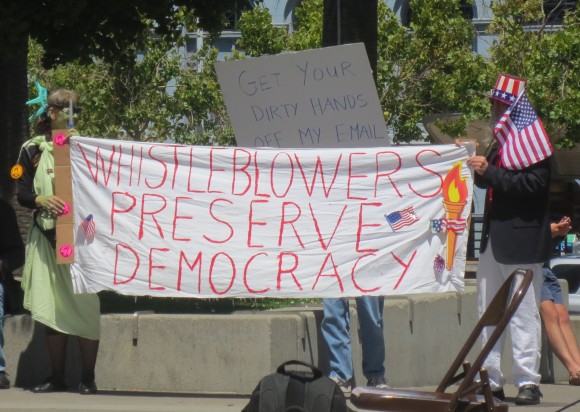
Photo credit: Richard Hay for aNewDomain.net
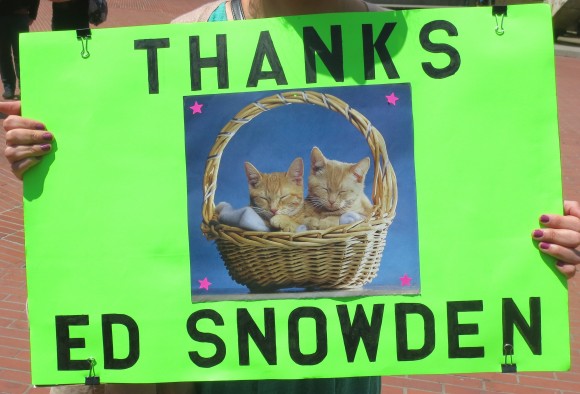
She said she thought that Snowden deserved a good night’s sleep. Photo credit: Richard Hay
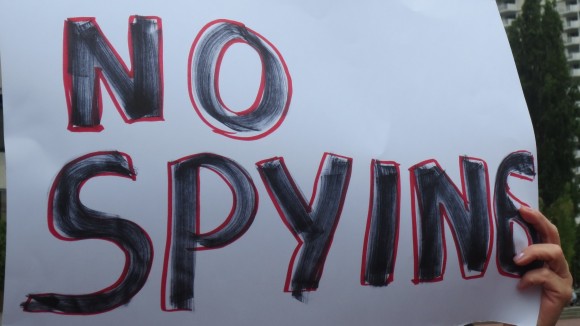
Photo credit: Richard Hay for aNewDomain.net
In all, the rally was an amazing gathering of people who would usually disagree about a great many things. But they were all united in outrage at the kind of blanket spying being done in the name of protecting the public.
At one point a speaker was making this above-mentioned point and someone yelled out, “Finally I agree with my Dad about something!”
Well said. I agree with you and your dad, too. That, again, is just my personal opinion.
Richard Hay is the senior science editor at aNewDomain.net. He’s a staff engineer in network testing at Google. Email him and let him know the sort of stuff you’d like him to cover here on aNewDomain.net. He’s Richard@aNewDomain.net and +Richard Hay on Google+.

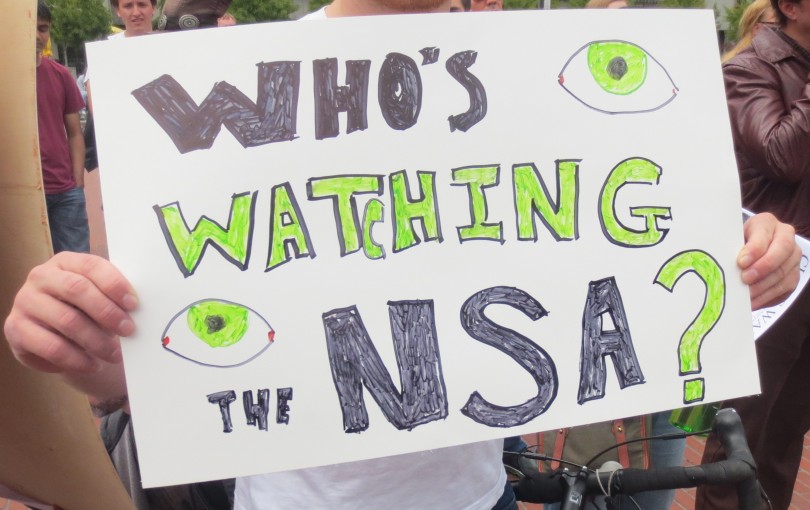






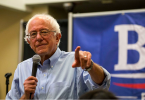

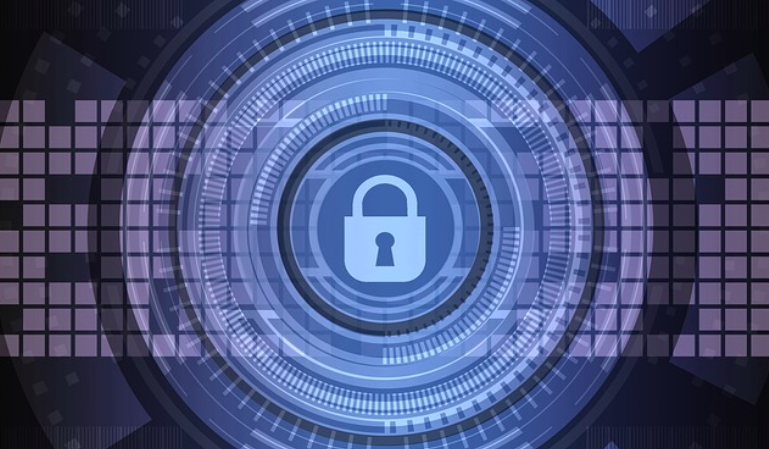
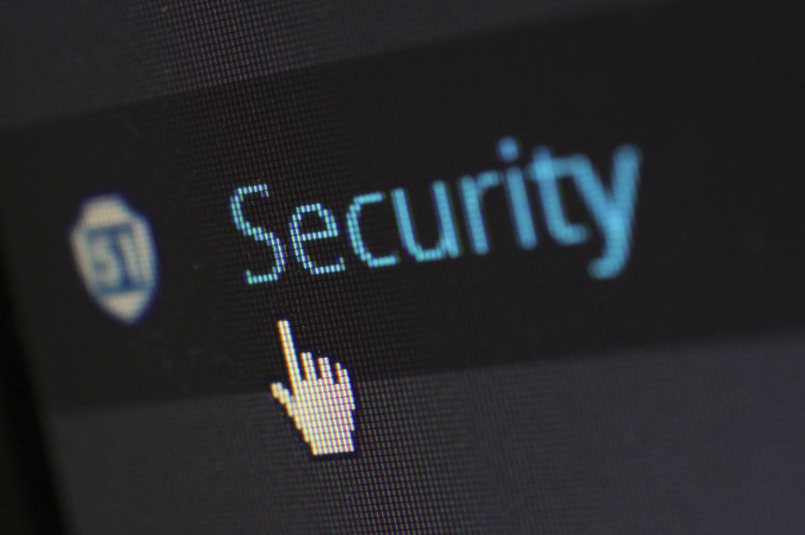
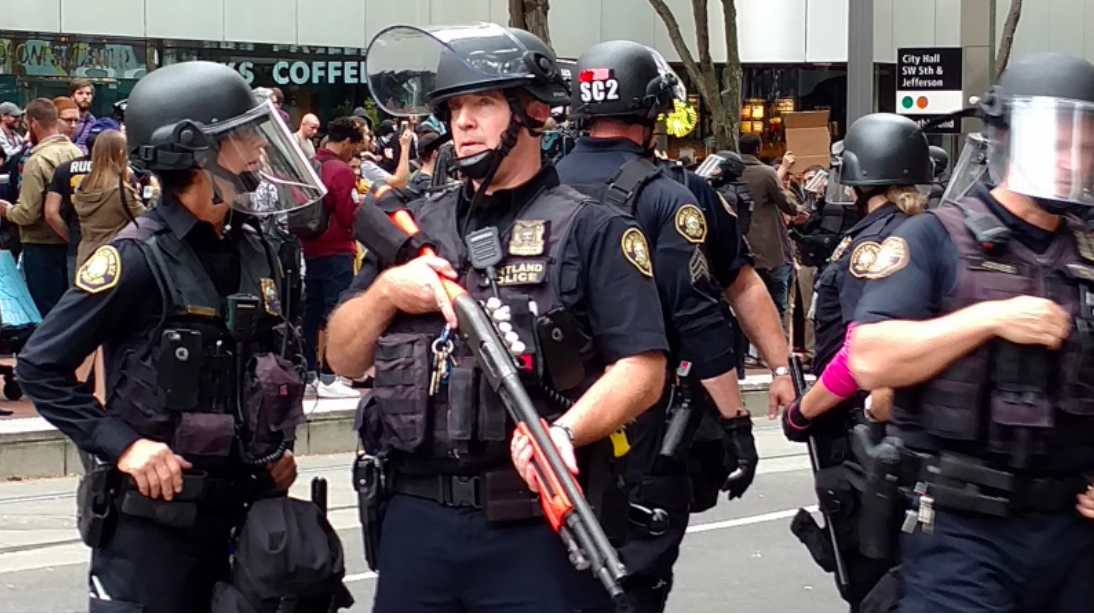
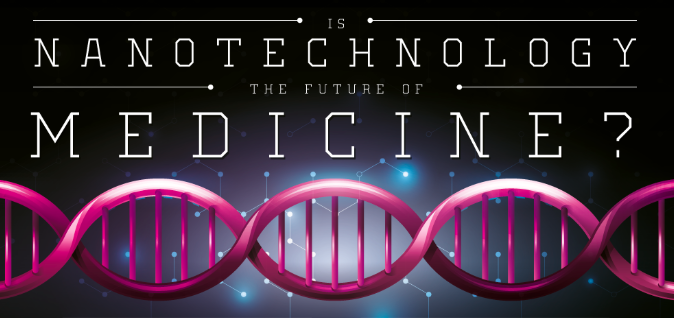
Terrific photo report! I agree that Snowden like Ellsberg and Manning is a hero–someone who stands between the forces of all-consuming power grabbing government and the people.
‘They who can give up essential liberty to obtain a little temporary safety, deserve neither liberty nor safety.’ – Benjamin Franklin. As true today as two hundred years ago. The ending *should* read “Shall soon find they have neither liberty nor safety.”